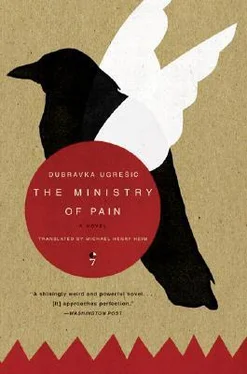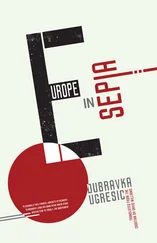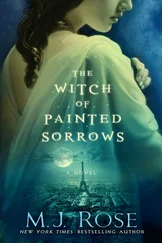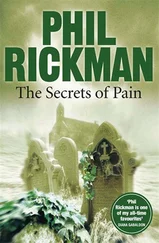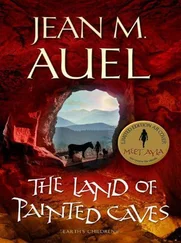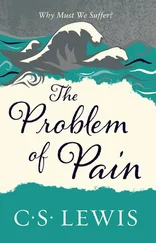After calming down a bit, I realized Cees hadn’t promised anything. Nor was he to blame for anything. I was without resources, inner or outer. I was vulnerable, up for grabs. Anybody could pick me up, toss me on my back, do what he wanted with me, and leave me battered and bruised. That’s why I was such easy prey for Ines’s babble, why I got stuck in the honey of her words. Nor was she to blame any more than Cees. I had lost my integrity. I had put on a mask as a means of defense, and it had merged with my face, made deep inroads into my person. I was no longer myself.
On my way out of the café, I passed Igor. He was in his usual pose: earphones on and book open. He didn’t notice me. Suddenly I thought of the Americans whose children I’d sat for in Berlin, the ones who never failed to introduce me to their friends. “ This is Tanja, our babysitter. She comes from the former Yugoslavia. Tanja is wonderful with children. She really has a way with them .”
“You one of us?”he asks with a shrewd look and a grin that shows a gold tooth. His pal has a moist cigarette dangling from the corner of his mouth.
“Yes, I’m one of us,” I say. “Where are you two from?”
“I’m from Smederevo, and this guy here’s from Kumanovo. You?”
“Me? I’m from Mars,” I say.
Now both are grinning.
“There ain’t nothin’ like our guys,” the Gypsy said to his pal. “It’s the lip on them.” Then he turned to me. “Want us to play somethin’ for you?”
“Why not.”
“Somethin’ from home how’s ’bout. From Mars.”
“Great.”
He picked up his clarinet, and his pal slung his accordion around his shoulders and threw down his cigarette.
I pulled a hundred-guilder banknote out of my bag and dropped it in the hat.
The accordion player glanced down at the banknote and wailed, “For God’s sakes, sister. You crazy or somethin’ throwin’ away money like that? Keep it for a ’mergency, for one of them rainy days. Sure, leave us a guilder or two, but this? Aaaii! Don’t be crazy, man. Money don’t grow on trees!”
I dismissed his concern with a wave of the hand and moved off into the crowd, feeling the painful Gypsy shrapnel— “Set, O golden sun, go down. Make the sky dark for the moon…” —explode in my heart and lodge there. And suddenly my heart was bathed in blood, and the ice coating its walls started to melt, and I staggered through the marketplace dripping blood.
The Albert Cuyp Market is the largest and most famous in Amsterdam. It is located in the Pijp, a former working-class district. Its scales, of which there are said to be over three hundred, come out every morning and don’t come down until late in the afternoon. The idea of buying fish, fruit, or vegetables was only a rational cover for the vague magnetism that would draw me toward the market, engulfed as it was in a mist of pollen and the strong scents of spices from beyond the seas — cinnamon, cloves, nutmeg — shot through with wind and salt. The air fairly sparkled with the bolts of rich silk and thick plush, of exotic jewels, of gold and beads, of the mother-of-pearl of immodestly open shells, of the glittering silver of fresh fish. The apples in my marketplace had a golden luster all their own; each grape glowed like a tiny lantern; the milk was as rich and white as a Vermeer woman’s skin.
There were times, however, when the magnetism lost its force, when a dead fish lay heavy on the scales and the apples, though still red, and the lettuce, though still green, had lost their sheen. Not far from the scales were seedy vendors of cheap clothing, the air around them electrified by the synthetic fabrics; not far from the scales were vendors of bric-a-brac one would be hard put to find names for: cloths that might be dusters, plastic brushes of various shapes and sizes, nylon chignons in all colors, wooden backscratchers with plastic fingers, packaged snack foods. Not far from the scales were vendors of soap, shampoo, face cream, shabby handbags, artificial flowers, shoulder pads, patches, needles and thread, pillows and blankets, prints and frames, hammers and nails, sausage and cheese, chickens and pheasants, moth-eaten scarves…
Wandering among the stands, my heart full of Gypsy shrapnel, I chanced upon something that immediately caught my eye: a plastic tote bag with red, white, and blue stripes — Ana was right; I paid only two guilders for it — and like a wound-up mechanical toy, I made for the butcher’s called Zuid (South), a code word to the local Yugos, who were its principal patrons. The butcher’s window proudly displayed jars of pig’s knuckles, and the shelves were lined with a modest selection of Yugonostalgic delicacies: Macedonian ajvar , sausage from Srem, olive oil from Korcula, Plasma Biscuits (whose ridiculous name made them an instant cult item the moment they appeared on the market), Minas coffee (which of course came from Turkey), and Negro Chimney-Sweep toffee (also a cult item because of the name). I bought a jar of ajvar and some toffee. It was a ritual purchase, purely symbolic: I hated ajvar and the toffee was bitter.
Thinking of the thousands and thousands of émigrés who leave their countries for countries like this one, who buy ajvar they hate and toffee they know is bitter, carryalls they will never use, ludicrous plastic-fingered backscratchers, and nylon chignons, I proceeded on my mechanical-toy journey, now heading toward the side street off the Oosterpark where a Bosnian café by the name of Bella was located. There I found a group of sullen, tight-lipped men playing cards. The looks they gave me were long but completely expressionless: not even a woman entering their male space could throw them off guard. I took a place at the counter, ordered “our” coffee, and sat there, penitent, so to speak. Before long I began to feel the invisible slap on my face and noticed I had hunched over like the men.
Having finished the coffee, I picked up the relics I had gathered on my pilgrimage — the Macedonian ajvar and Negro Chimney-Sweep toffee in the plastic carryall with red, white, and blue stripes — and set off for home. The Gypsy shrapnel had dissolved in my heart in the interim, and I was no longer bleeding, but I was confused as to whether I had just bid farewell to something or filled in an invisible application form. “For God’s sakes, sister. You crazy or somethin’?”
I’m like a stepping razor
Don’t you watch my size
I’m dangerous, I’m dangerous
Treat me good
If you wanna live
You better treat me good.
Peter Tosh
I knew it wasIgor the moment I heard the doorbell ring. I knew he’d be coming for an explanation. He came in, walked around the room as if it were too small to contain him and he wasn’t yet sure whether to stay or not, but then he put his backpack on the floor and said, “Hmm. So this is your pad.”
“Yes, this is my ‘pad.’”
“Living room — bedroom, kitchen facilities, and bath,” he said ironically. “‘Tight quarters, two meters by three.’” He was quoting a Yugoslav TV commercial.
“I hope your place is better.”
“So you’ve made your little nest in the basement.”
“Let’s just call it the lower level.”
“Don’t have many books, do you,” he said, glancing around the room, “considering your profession, that is.”
“Would you like something to drink?” I asked, ignoring the remark.
“Coffee will do. I don’t see you stocking anything else in this place.”
While making the coffee, I thought of what to tell him. Although the cups were clean, I gave them another wash. It took me forever to find the sugar bowl. I did everything I could to buy time.
Читать дальше
